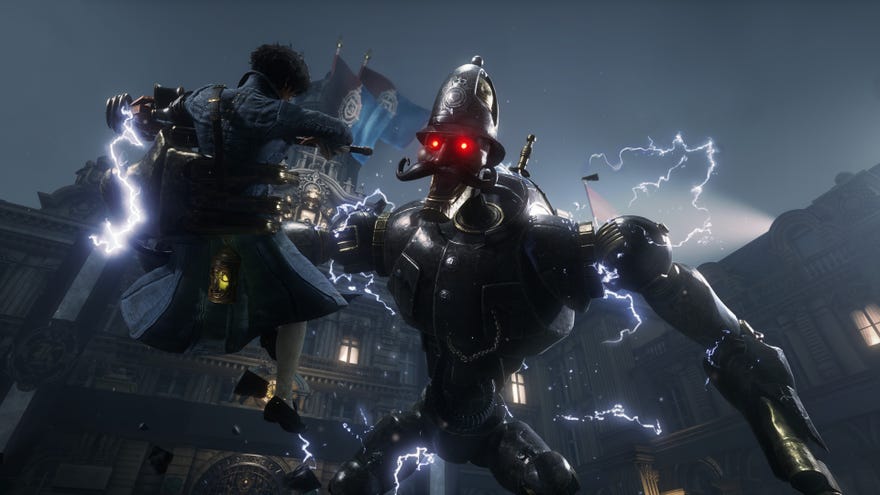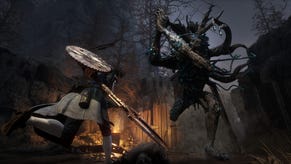Lies Of P review: the closest we'll get to Bloodborne on PC, probably
I'm not lying
At first glance, Lies Of P looks like a wannabe Bloodborne reskin, replacing the Gothic edges of Yarnham with a twisted version of a kid's fairytale. There are silhouettes in windows sheltering from an infection that's plagued the populace and puppets who've gone awol. Take damage and you've got a chance to recoup the costs by smacking the baddie back. There's a bit where you platform down a large well, thin planks of wood marking your descent. Survive and you might want to visit your doll-like maiden and spend your souls.
But is Lies Of P just another boring pretender to Bloodborne? No! I think it's worked with its Gothic Pinocchio theme remarkably well, and the option to snap and configure your puppet lad to your liking makes its journey feel distinct. Sure, Lies Of P might lack some of the presence of its main inspiration, and not all of its parts come together to form a cohesive whole, but the game is an undeniable must for Soulslikers who crave the dark. It's perhaps the closest any Soulslike has felt to a FromSoft game, in everything from its presentation to the cadence of your character's jog.
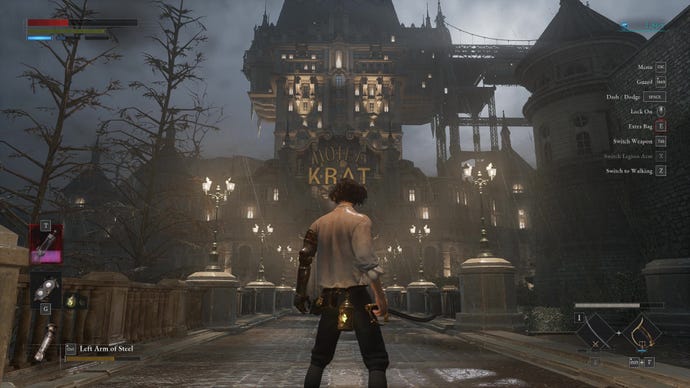
You'd think a dark fantasy take on kid's tale Pinocchio would be a bit cringe but, incredibly, it's not too bad. Early on I was a bit skeptical about Jiminy Cricket being renamed Gemini because it's a cooler name, as I thought it might be a sign the devs dressed up a kid's fairytale for Halloween, not for a game that's obliged to take itself quite seriously. But no! Famous puppeteers and other themes are woven into a believable tale you want to unravel. Namely, it's one where you're trying to discover why puppets have woken up one day and slaughtered everyone, betraying their covenant. And while it's grim and does take itself fairly seriously, the relative upbeatness of Gemini and the ridiculous theater of weapons and enemies and silly costumes loosen things up enough that doesn't veer into being totally blind to the fact it's a game based on a wooden boy with an insect for a mate.
Ironically, the one bit of the game that doesn't land for me is the "lies" part, which sadly does not end in your nose growing comically large. Instead, a mechanical door might ask you whether you're a human or a puppet. An old lady might ask whether you can still see a trace of their younger, more beautiful self. And whether you tell the truth or lie, your springs will react, causing a swirling red sizzle about P… and that's about your lot. Otherwise your decisions determine different endings, which is grand and all, but it reduces the intricacies of a fib to a point on a tally board. And there's also a tension between the cryptic nature of the game's storytelling - told through sharp dialogue and loaded item descriptions - with the consequences of your lies. The problem being that you leave a truth or lies decision knowing full well any possible ramifications may never seek you out. Your cogs might react and the red might swirl, but at the end of the day, the world you're in at that very moment always falls silent.
Much like other Soulslikes, the pivot of your adventure lies in a hub space, this time called Hotel Krat, where you'll go to level up, talk to important folks, and move the story forwards. Early on it's a very big space with rooms you'll gradually fill as you bump into weirdos on your travels through Krat and beyond. I like how it's all laid out intuitively, to the point where it becomes so ingrained in your memory banks it's the first place your mind turns to when you've accomplished something. You'll go, "My boy Gepetto might want to know this" - and the game will even take the guesswork out of it for you by highlighting who actually wants to speak to you before you warp there. What a fantastic touch.
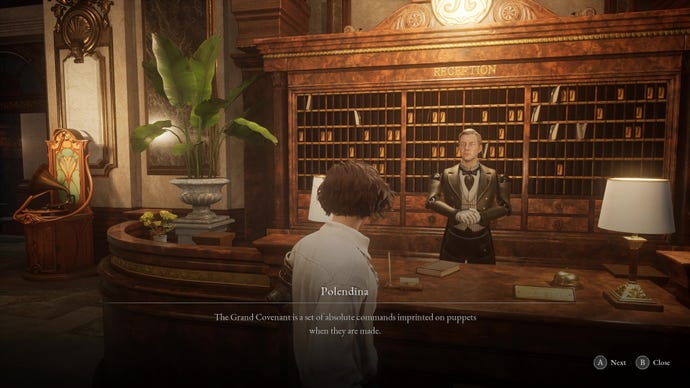
Hotel Krat isn't the only space that's cleverly designed, and I'd argue every single one of Lies Of P's zones interlocks in some way. There are plenty of moments where you'll wind back on yourself without knowing, or look out at a vista and clock the battles you'd raged in those spires over yonder. A highlight for me would be the innerworkings of a puppet factory and beyond, as it sees you wind through awkward platforming sections, nip at the ankles of colossal hunks of metal, then emerge suddenly onto a spooky dirt path towards a dubious forest community. For the most part the environments are gorgeous, although there's maybe a little too much reliance on ruined streets and shopping malls with small rooms and panelled wood.
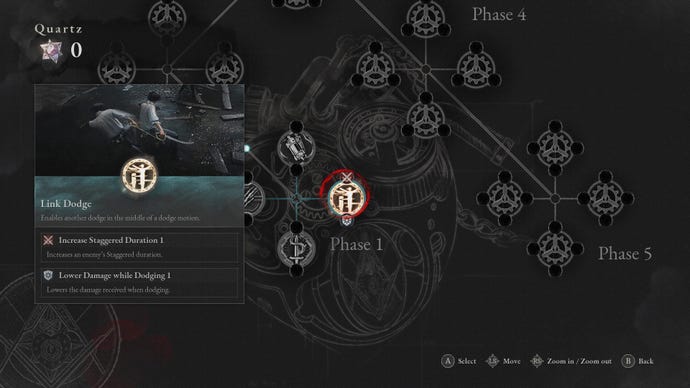
When it comes to battering puppets in any location, though, Lies Of P excels. At its heart, it's weighty and home to attack animations that flow into one another beautifully. Dodge backwards after a swing and you might pirouette out of danger, sending sparks of metal kicking up from the soles of your metal sneaks. Follow it up with an attack and you'll lunge forwards, as if you're snapping the combo back into place. For the Soulslike diehards and newcomers alike, it ticks the key box: fights never feel unfair.
The game might have one of the most satisfying parries, too. Time your block perfectly and not only will you take zero damage, you'll inflict a bit of stagger on your opponent, and round it off by damaging their weapon. Fights are rhythmic dances, as so often they are with Soulslikes, but LoP's parry can elevate them so your blocks can deaden the beat. One time I struggled with this rapier-wielding bloke dressed as a rabbit, who'd pin me in a small space and let rip with quick jabs. I got him eventually by parrying him so much his rapier snapped to a cute lil' stub that did no damage, so no matter how much he hit me I just shrugged off his dinky thuds and cracked him with my greatsword.
Then you've got the whole Legion Arms thing, which has P swap out his robotic left arm for all sorts of mechanical arms with all sorts of mechanical properties. One lets you belch fire from your fists, another electricity. My fave has you spray blue corrosive gunk on the floor, while I'm looking to upgrade another that pops mines on the ground. I'd say they're cool until you realise they're a bit underpowered much, much later in the game, at which point you've finally bulked them out with rare resources. They lack the quiet authority and snap of Bloodborne's side pistols or blunderbusses, which, no matter how underlevelled, can still spell disaster for any enemy if the trigger is pulled at the right time.
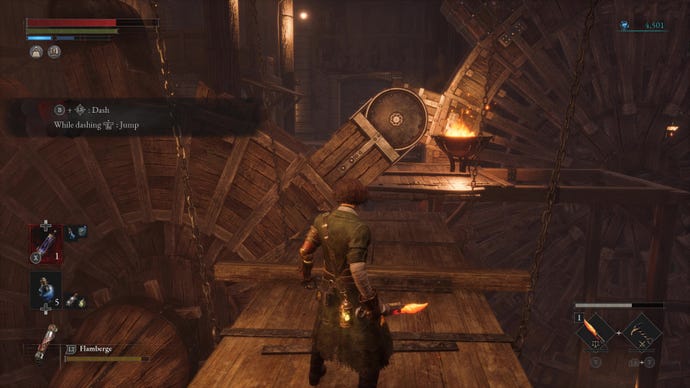
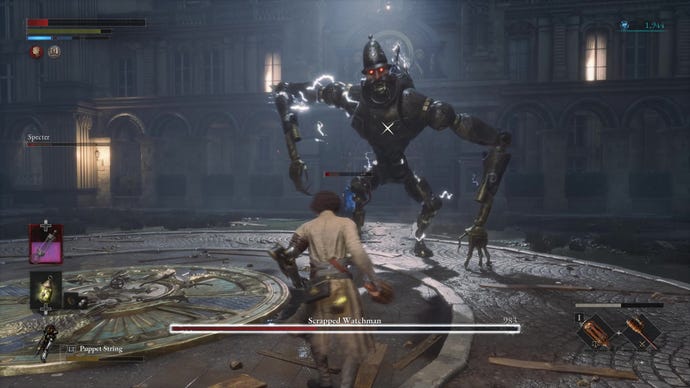
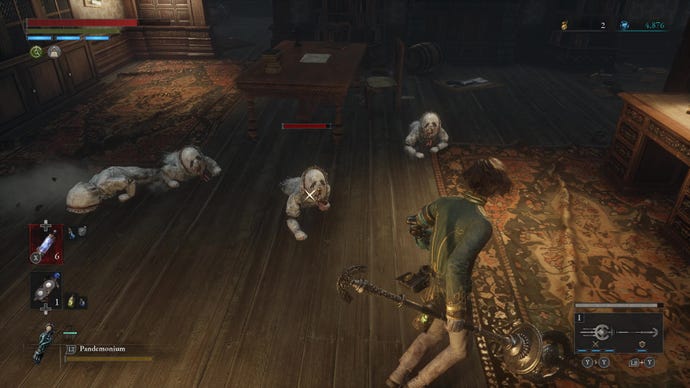
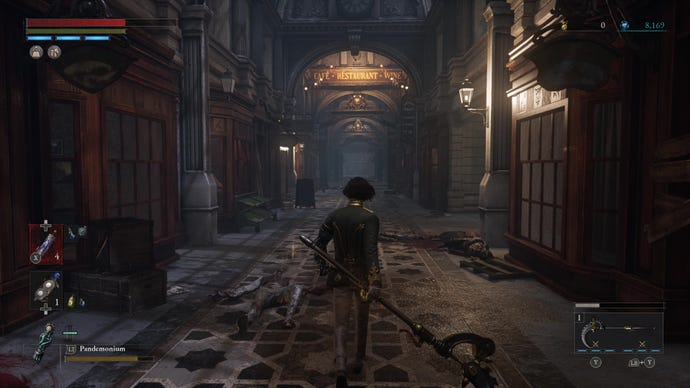
In a final flourish, the game lets you disassemble almost every weapon, splitting them into heads and handles. Any head can be attached to any handle, with both things home to their own abilities. The flexibility to create your own weird stabbers and staves is fantastic, especially as it lets you tinker freely without penalty. While it's not essential, I'd argue the game's toughest fights will encourage you to cook up some abominations to cut your losses and maximise your strengths. I've settled on a fiery dagger stuck to a spear, and an electric mace head stuck to a twirly greatsworld hilt. But it's a shame you can't rip apart the unique boss weapons, which have some of the most impressive movesets.
There's no denying Lies Of P is an excellent Soulslike with a host of additions that separate it from the competition. Again, I think it's the closest any studio has ever gotten to the feel of a FromSoft game, and it's mixed with a meaningful theme that's more compelling than cringe. Some of the boss fights are spectacular, too, with one against puppet royalty that blew me away just from his intro. But for all of the game's additions, it stubbornly follows the unclear, incremental levelling conventions of the genre (please someone explain to me what Motivity and Advance actually mean and what they do). And being unable to gather your strength elsewhere when brickwalls arise feels particularly restrictive and, dare I say it, old fashioned.
Is Lies Of P Bloodborne just Bloodborne with puppets, then? I say again, no! Lies Of P is a fitting ode and a definite must play for fans of From's dark epic, just don't expect it to match Bloodborne's supernatural cinema.
This review is based on a copy of the game provided by the developer Neowiz.
